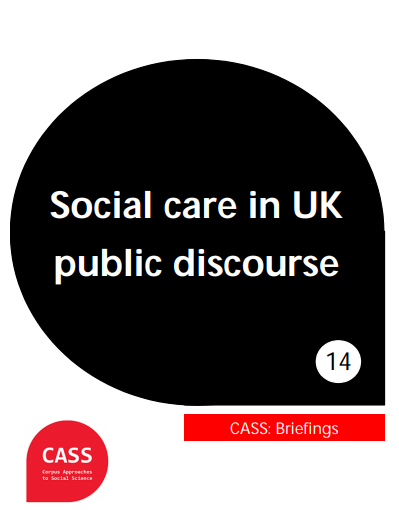New briefings coming soon!
CASS: Briefings is a series of short, quick reads on the work being done at the ESRC/CASS research centre at Lancaster University, UK. Commissioning work from internationally recognised academics in the field of Corpus Linguistics, CASS: Briefings set out to make cutting edge research easily accessible, providing a good introduction to the variety of vital and exciting research going on in the area of Corpus Linguistics.
 Corpus: Some key terms. Our introductory CASS: Briefing. What is corpus linguistics? Which software packages are available, what can they do, and how much do they cost? Read this glossary for an overview of corpus linguistic terminology.
Corpus: Some key terms. Our introductory CASS: Briefing. What is corpus linguistics? Which software packages are available, what can they do, and how much do they cost? Read this glossary for an overview of corpus linguistic terminology.
 Representations of Islam in the British press, 1998 – 2009. Is the British press Islamophobic? How are Islam and Muslims typically written about? Have representations of Islam and Muslims changed over time, particularly since 9/11? Are some newspapers less ‘friendly’ towards Muslims than others? Read this CASS: Briefing of a large-scale corpus-based discourse analytical study to discover more.
Representations of Islam in the British press, 1998 – 2009. Is the British press Islamophobic? How are Islam and Muslims typically written about? Have representations of Islam and Muslims changed over time, particularly since 9/11? Are some newspapers less ‘friendly’ towards Muslims than others? Read this CASS: Briefing of a large-scale corpus-based discourse analytical study to discover more.
Researching online abuse: the case of trolling. Arguably, the biggest technological advancement in recent times is the internet. Sadly, however, the internet also presents new opportunities to act maliciously. Increasingly worrying are offensive behaviours such as trolling and cyberbullying that involve individuals, and sometime whole groups, harassing others, sometimes for no other reason than to entertain themselves. Yet research into this subject is in short supply in the social sciences, in spite of there being a real need for it.
 Opposing gay rights in UK Parliament: Then and now. How has the expression of opposition to gay rights changed in Parliamentary speeches in recent years? How are discussions of gay people involved in these changes? To what extent could these arguments be seen as homophobic? Read this CASS: Briefing of a diachronic corpus-based discourse analysis to find out more.
Opposing gay rights in UK Parliament: Then and now. How has the expression of opposition to gay rights changed in Parliamentary speeches in recent years? How are discussions of gay people involved in these changes? To what extent could these arguments be seen as homophobic? Read this CASS: Briefing of a diachronic corpus-based discourse analysis to find out more.
 The EDL: moving right-wing populism online in the UK. The English Defence League (EDL) is a far-right populist political movement and campaigns specifically on issues concerning the presence of Muslims and Islam in Western societies. This briefing from CASS presents the results of a corpus study on the online activities of the EDL and its supporters. The briefing shows that, although the hierarchy of the EDL claims to be specifically concerned with radical Islam, the discourse of supporters is less focussed and contains more explicit forms of Islamophobia.
The EDL: moving right-wing populism online in the UK. The English Defence League (EDL) is a far-right populist political movement and campaigns specifically on issues concerning the presence of Muslims and Islam in Western societies. This briefing from CASS presents the results of a corpus study on the online activities of the EDL and its supporters. The briefing shows that, although the hierarchy of the EDL claims to be specifically concerned with radical Islam, the discourse of supporters is less focussed and contains more explicit forms of Islamophobia.
 A ‘battle’ or a ‘journey’? Metaphors and cancer. Metaphors matter because they ‘frame’ topics in different ways, which can affect our perception of ourselves and our experiences. The ‘battle’ metaphor for cancer has become controversial because of the framing it may impose on the patient’s experience; the ‘journey’ metaphor frames the cancer experience very differently. We were particularly concerned with whether and how different metaphors may place the patient in an ‘empowered’ or a ‘disempowered’ position, and with the resulting emotional associations.
A ‘battle’ or a ‘journey’? Metaphors and cancer. Metaphors matter because they ‘frame’ topics in different ways, which can affect our perception of ourselves and our experiences. The ‘battle’ metaphor for cancer has become controversial because of the framing it may impose on the patient’s experience; the ‘journey’ metaphor frames the cancer experience very differently. We were particularly concerned with whether and how different metaphors may place the patient in an ‘empowered’ or a ‘disempowered’ position, and with the resulting emotional associations.
What words are most useful for learners of English? Introducing the New General Service List. Learning vocabulary is a complex process in which the learner needs to acquire both the form and a variety of meanings of a given vocabulary item. General vocabulary lists can assist in the process of learning words by providing common vocabulary items. In response to problems identified in the currently available General Service List, the authors decided to investigate the core English vocabulary with very large language corpora using current corpus linguistics technology.
 How to communicate successfully in English? An exploration of the Trinity Lancaster Corpus. Many speakers use English as their non-native language (L2) to communicate in a variety of situations: at school, at work or in other everyday situations. As well as needing to master the grammar and vocabulary of the English language, L2 users of English need to know how to react appropriately in different communicative situations. In linguistics, this aspect of language is studied under the label of “pragmatics”. This briefing offers an exploration of the pragmatic features of L2 speech in the Trinity Lancaster Corpus of spoken L2 production.
How to communicate successfully in English? An exploration of the Trinity Lancaster Corpus. Many speakers use English as their non-native language (L2) to communicate in a variety of situations: at school, at work or in other everyday situations. As well as needing to master the grammar and vocabulary of the English language, L2 users of English need to know how to react appropriately in different communicative situations. In linguistics, this aspect of language is studied under the label of “pragmatics”. This briefing offers an exploration of the pragmatic features of L2 speech in the Trinity Lancaster Corpus of spoken L2 production.
 Language surrounding poverty in early modern England: Constructing seventeenth-century beggars and vagrants. This briefing concentrates upon attitudes towards a subset of poor people – a group who might today be termed beggars or vagrants. Seventeenth century vagrants were a marginalised group: they were overwhelmingly illiterate and politically powerless. By undertaking a study of them, we hope to improve our understanding of a people who were effectively voiceless in their own time. On a practical level, it is important to understand changing discourses on the poor because legislative change was influenced by changing public perceptions of poverty.
Language surrounding poverty in early modern England: Constructing seventeenth-century beggars and vagrants. This briefing concentrates upon attitudes towards a subset of poor people – a group who might today be termed beggars or vagrants. Seventeenth century vagrants were a marginalised group: they were overwhelmingly illiterate and politically powerless. By undertaking a study of them, we hope to improve our understanding of a people who were effectively voiceless in their own time. On a practical level, it is important to understand changing discourses on the poor because legislative change was influenced by changing public perceptions of poverty.
 Hate Speech: Crime against Muslims. The notion of ‘hate crime’ might conjure up an image of premeditated violence perpetrated by a bigoted thug. But in reality, a majority of so-called ‘hate crimes’ are committed with little aforethought by very ordinary people in ordinary circumstances and involve a verbal assault rather than physical attack. This briefing provides the key research findings from the project as it provided important groundwork for a CASS research project launched in 2014 on The management of hateful invective by the courts.
Hate Speech: Crime against Muslims. The notion of ‘hate crime’ might conjure up an image of premeditated violence perpetrated by a bigoted thug. But in reality, a majority of so-called ‘hate crimes’ are committed with little aforethought by very ordinary people in ordinary circumstances and involve a verbal assault rather than physical attack. This briefing provides the key research findings from the project as it provided important groundwork for a CASS research project launched in 2014 on The management of hateful invective by the courts.
 Analysing narratives in the Corporate Financial Information Environment. Transparent and effective communication between firms and the investment community is a key determinant of corporate success. Audited financial statements and associated narrative disclosures are among the main methods that firms use to communicate with investors and analysts. These disclosures combine with information from financial journalists and other market commentators to form the Corporate Financial Information Environment (CFIE). While a considerable body of work exists on financial narratives, research has been limited by the methods used for measuring the characteristics and quality of such disclosures. In particular, the need to hand-collect relevant data from firms’ annual reports and the subjectivity of textual scoring based on manual methods has restricted progress. Recent advances in computational and corpus linguistics provide a basis for undertaking more sophisticated analyses.
Analysing narratives in the Corporate Financial Information Environment. Transparent and effective communication between firms and the investment community is a key determinant of corporate success. Audited financial statements and associated narrative disclosures are among the main methods that firms use to communicate with investors and analysts. These disclosures combine with information from financial journalists and other market commentators to form the Corporate Financial Information Environment (CFIE). While a considerable body of work exists on financial narratives, research has been limited by the methods used for measuring the characteristics and quality of such disclosures. In particular, the need to hand-collect relevant data from firms’ annual reports and the subjectivity of textual scoring based on manual methods has restricted progress. Recent advances in computational and corpus linguistics provide a basis for undertaking more sophisticated analyses.
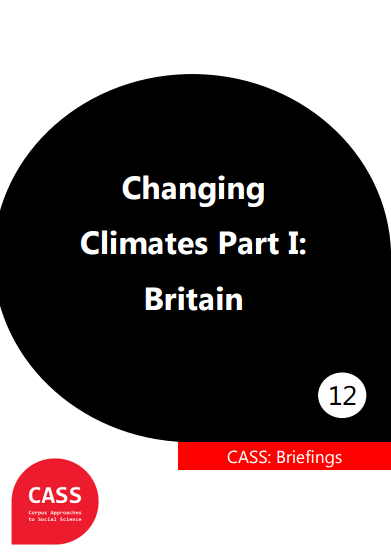 Changing Climates Part I: Britain. Climate change is now widely recognised as one of the major challenges that humanity will have to face in the 21st century. There is growing scientific evidence that humans are changing the climate system with the substantial amount of greenhouse gas (GHG) emissions being spewed into the atmosphere since the pre-industrial era. As the global temperature increases, so do the risks of abrupt and irreversible changes. It is expected to affect all continents and countries at all levels of development. As human actions are at the very centre of the problem, such mismatch between the scientific discourse and the public perception of the gravity of the problem is a matter for concern.
Changing Climates Part I: Britain. Climate change is now widely recognised as one of the major challenges that humanity will have to face in the 21st century. There is growing scientific evidence that humans are changing the climate system with the substantial amount of greenhouse gas (GHG) emissions being spewed into the atmosphere since the pre-industrial era. As the global temperature increases, so do the risks of abrupt and irreversible changes. It is expected to affect all continents and countries at all levels of development. As human actions are at the very centre of the problem, such mismatch between the scientific discourse and the public perception of the gravity of the problem is a matter for concern.
This research project explores one type of discourse that is believed to influence the ways in which the public has perceived and responded to climate change issues: the news media discourse. Our primary purpose is to examine how climate change issues have been framed in British broadsheet newspapers between 2003 and 2013.
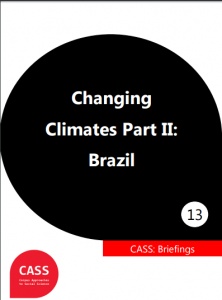
This research project seeks to contrast the debate around climate change issues in Britain and Brazil. These are among the largest economies in the world and are also major emitters of greenhouse gases. At the same time, they have both adopted significant measures to curb emissions and are major players in international debates on global warming, but differ in relation to key points.
Social care in UK public discourse. How is social care represented in public discourse in the UK, and what are the implications for current perceptions and future possibilities? This briefing provides the key findings from research commissioned by #socialcarefuture – ‘a growing movement of people with a shared commitment to bring about major positive change in what is currently called “social care.”’ Initiatives aimed at achieving positive change through alternative framings require systematic evidence of how social care is currently framed. The provision of this evidence was the goal of this project.
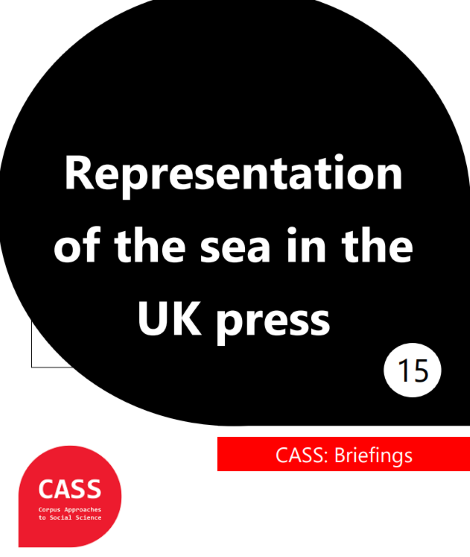 Representations of the Sea in the UK Press. This project aimed to provide a systematic account of the way the sea is represented by applying corpus linguistic methods to the analysis of representations of the sea in the UK press.
Representations of the Sea in the UK Press. This project aimed to provide a systematic account of the way the sea is represented by applying corpus linguistic methods to the analysis of representations of the sea in the UK press.
currently framed. The provision of this evidence was the goal of this project.
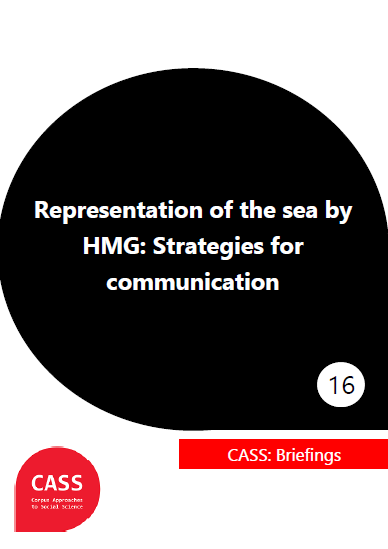 Representation of the sea by HMG. The project provides a systematic account of the way the sea is represented by HMG by applying corpus linguistic methods to the analysis of .gov textual production.
Representation of the sea by HMG. The project provides a systematic account of the way the sea is represented by HMG by applying corpus linguistic methods to the analysis of .gov textual production.



